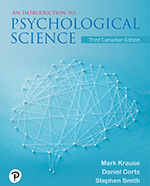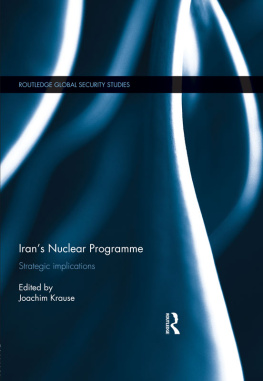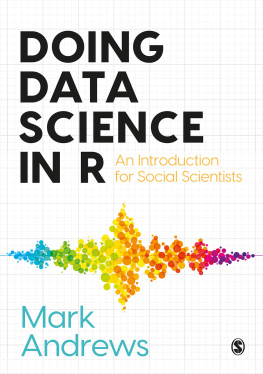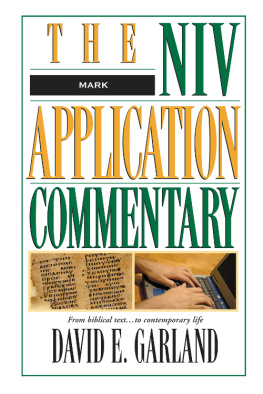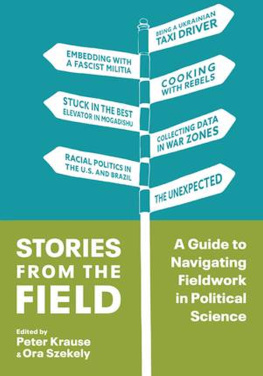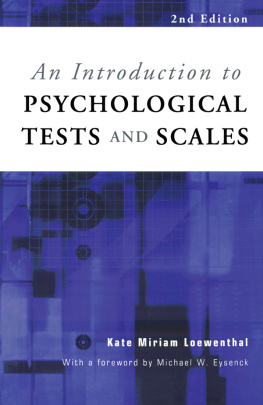Mark Krause - An Introduction to Psychological Science
Here you can read online Mark Krause - An Introduction to Psychological Science full text of the book (entire story) in english for free. Download pdf and epub, get meaning, cover and reviews about this ebook. year: 2020, publisher: Pearson Education Canada, genre: Science. Description of the work, (preface) as well as reviews are available. Best literature library LitArk.com created for fans of good reading and offers a wide selection of genres:
Romance novel
Science fiction
Adventure
Detective
Science
History
Home and family
Prose
Art
Politics
Computer
Non-fiction
Religion
Business
Children
Humor
Choose a favorite category and find really read worthwhile books. Enjoy immersion in the world of imagination, feel the emotions of the characters or learn something new for yourself, make an fascinating discovery.
- Book:An Introduction to Psychological Science
- Author:
- Publisher:Pearson Education Canada
- Genre:
- Year:2020
- Rating:4 / 5
- Favourites:Add to favourites
- Your mark:
- 80
- 1
- 2
- 3
- 4
- 5
An Introduction to Psychological Science: summary, description and annotation
We offer to read an annotation, description, summary or preface (depends on what the author of the book "An Introduction to Psychological Science" wrote himself). If you haven't found the necessary information about the book — write in the comments, we will try to find it.
An Introduction to Psychological Science — read online for free the complete book (whole text) full work
Below is the text of the book, divided by pages. System saving the place of the last page read, allows you to conveniently read the book "An Introduction to Psychological Science" online for free, without having to search again every time where you left off. Put a bookmark, and you can go to the page where you finished reading at any time.
Font size:
Interval:
Bookmark:
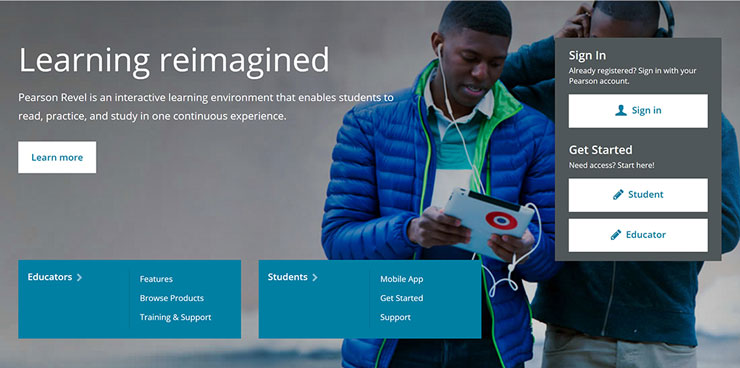
Pearson Education
From the Authors
It is our privilege to welcome you to the third Canadian edition of An Introduction to Psychological Science. We would not have had this opportunity without the support and feedback of the instructors who have adopted this book for their classes, and from their students (and our own) who have learned from this book. Why is it time for a third edition? As you should already know, psychological science progresses quickly, and we want to ensure we represent significant advances or theoretical challenges that are happening right now. In addition, there are examples and applications of psychological principles in the media all of the time, and we want to include these in the learning experience, whether in the text or in online activities. While keeping the book up-to-date with the latest research and current events, we also want to improve on our presentation of classic studies, research methods, and so on that remain in the foundation of our discipline. This is where the feedback from our readers has been so important. Thanks to everyone who has shared what they have enjoyed about this book as well as what we might be able to do betterwe believe we have, in fact, done better!
Despite the updates and fine-tuning, the heart of this project has always been scientific literacy. The term indicates that memorizing facts should not be the ultimate objective of your introduction to psychology; instead literacy emphasizes your ability to encounter, understand, and evaluate scientific information. Scientific literacy comprises four interrelated components:
1. Knowledge: What do we know about a phenomenon?
2. Scientific explanation: How does science explain the psychological process we are examining?
3. Critical thinking: How do we interpret and evaluate all types of information, including scientific reporting?
4. Application: How does research apply to our own lives and to society?
To make scientific literacy the core of our book and the Revel experience, we developed content, quizzes, activities, and other features with the scientific literacy model (shown in the graphic) as a guide. This represents how the four competencies each represent a different facet of scientific literacy, whereas the multidirectional arrows show their interdependence. In other words, you cant use scientific information (Application) if you dont fully understand it (Knowledge), or if there are not sound data and reasoning to support it (Scientific Explanation and Critical Thinking).
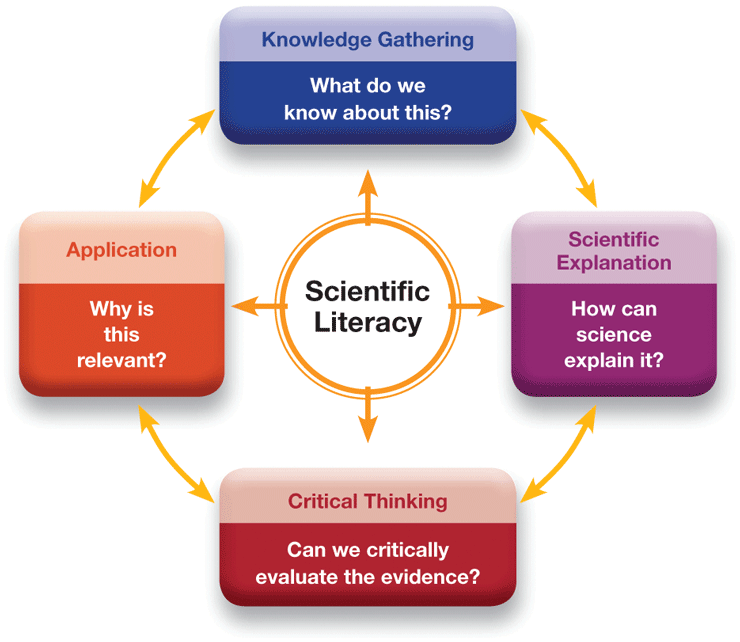
An Introduction to Psychological Science presents students with a model for scientific literacy; this model forms the core of how this book is written and organized. We believe a scientific literacy perspective and model will prove useful in addressing two course needs we often hear from instructorsto provide students with a systematic way to categorize the overwhelming amount of information they are confronted with, and to cultivate their curiosity and help them understand the relevance, practicality, and immense appeal of psychological science.
Psychological science is in a privileged position to help students hone their scientific literacy. It is both a rigorous scientific discipline and a field that studies the most complex of all phenomena: the behavioural, cognitive, and biological basis of behaviour. With this focus on behaviour, one can rightly argue that psychology resides at the hub or core of numerous other scientific disciplines; it also shares connections with neuroscience, education, and public health, to name a few linkages. From this perspective, the knowledge acquired by studying psychological science should transfer and apply to many other fields. This is great news when you consider that psychology is one of the few science courses that many undergraduates will ever take.
In the third Canadian edition of this textbook, we have continued our emphasis on helping the readers organize and assess their thinking and learning about the material. Each module includes learning objectives of increasing depth (knowing, understanding, analyzing, and applying) as well as quiz items that assess learning at each level. We have also included interactive materials using the Revel platform (found in the e-version of this book). Together, these tools should help make the concepts relevant to readers lives; this, in turn, should improve retention of the course material.
We would like to thank the many instructors and students who have helped us craft this model and apply it to our discipline, and we look forward to your feedback. Please feel free to contact us and share your experiences with the third Canadian edition of An Introduction to Psychological Science.
Mark Krause: krausema@sou.edu
Daniel Corts: danielcorts@augustana.edu
Stephen Smith: s.smith@uwinnipeg.ca
Writing the first Canadian edition of An Introduction to Psychological Science gave us a new appreciation for how important Canadian researchers have been to the study of psychological science. Although Canada is a relatively small country (in population and the number of research institutions), Canadian researchers have made incredibly important contributions to a number of areas of psychology. These important contributions are again highlighted in the third Canadian edition. We have also continued to focus on issues that are of particular relevance to Canadians, including bilingualism, environmental psychology, and the experiences of first- and second-generation immigrants to Canada.
As introductory psychology professors ourselves, we had a chance to use the first and second editions of our textbook in our own classes. The third edition of our textbook provides us with an opportunity to (1) add new, cutting-edge material to the discussion of various areas of our field, and (2) expand on topics that our own students have found particularly interesting. In fact, several of the changes to this edition of the book are a result of feedback and discussions with students in Winnipeg (as well as a few much-appreciated emails from students at other institutions).
The majority of university students are digital natives, meaning they have never lived in a world without mobile phones, the internet, and social media. These technological advances have brought about psychological changes. We study, work, relax, and socialize differently because many of these activities now take place over Instagram, Twitter, and other apps. In order to get readers thinking critically about psychology in our electronic lives, we have added the new #Psych feature. This feature addresses topics such as how to deal with misinformation on the internet, the impact of screen time on sleep, and how social networks may not be a good substitute for old-fashioned, face-to-face contact. Importantly, this section is not entirely negative! This feature also highlights potential benefits of the wired world, such as providing internet-based therapy for people who live in remote locations.
Each chapter of the third edition of this textbook has been updated to reflect the latest discoveries in psychology. Indeed, we have added new topics to all 16 chapters in the book. Here are some examples:
Chapter 1, Introducing Psychological Science, describes the foundations of psychology, which are unlikely to change: the nature of science, scientific literacy, and especially critical thinking. However, the world around us is definitely changing. To keep up with the times, Chapter 1 introduces the new feature, #Psych. This feature will appear in each chapter as a way of illustrating how psychology is found in the digital world while focusing on the content from that chapter. The first #Psych shows the importance of our foundational concepts when we encounter information online. How can we tell science from pseudoscience, where do we go to find accurate information, and how can we tell reliable news from propaganda?
Font size:
Interval:
Bookmark:
Similar books «An Introduction to Psychological Science»
Look at similar books to An Introduction to Psychological Science. We have selected literature similar in name and meaning in the hope of providing readers with more options to find new, interesting, not yet read works.
Discussion, reviews of the book An Introduction to Psychological Science and just readers' own opinions. Leave your comments, write what you think about the work, its meaning or the main characters. Specify what exactly you liked and what you didn't like, and why you think so.

